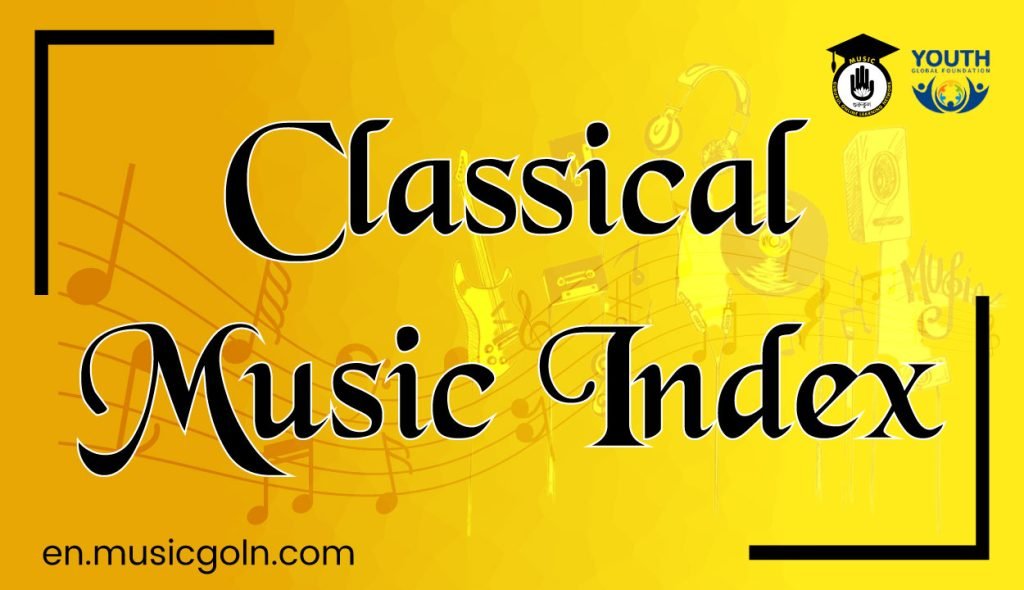In simple terms, classical music refers to the refined, codified musical traditions that evolve from the folk or indigenous music of a region or civilisation. While folk music tends to follow repetitive forms and is passed down orally without strict codification, classical music is characterised by systematic refinement, theoretical formulation, and established performance practices.
In essence, classical music emerges when folk elements are elevated, organised, and theorised into a structured and scholarly form, often accompanied by a rich set of aesthetic, philosophical, and cultural frameworks.
Classical Music Index
The Role of Shastra (Musical Treatises)
In the context of Indian and many Asian musical systems, classical music is directly tied to shastra, or musical treatises. These are systematic bodies of knowledge encompassing:
- Rules of raga and tala
- Vocal and instrumental techniques
- Performance conventions and improvisational methods
As Sufi Faruq Ibne Abubakar aptly put it:
“Classical music is not something that arose separately from folk music. Rather, it took the raw material of the local and rustic traditions, polished it, refined it, and framed it within codified structures by the hands of scholars and practitioners.”
This view bridges the oft-debated gap between the organic origin of melody and the disciplined manifestation of form.
The Connection Between Nature and Sound
Legendary Hindustani vocalist Ustad Bade Ghulam Ali Khan believed that melody is inseparable from geography—that just as the Almighty divided the earth into mountains, plains, and deserts, He also distributed the soundscape accordingly.
For instance:
- Folk melodies from mountainous regions like Alia-Fattu were transformed into the classical Pahadi Dhun, which later evolved into Raga Pahadi.
- Variants of Bhairavi are found in almost every plain-region folk music across the world.
- Raga Malkauns, although codified in Indian classical traditions, is believed by some to have eastern Himalayan or Chinese roots.
Similarly, from the rustic vibrancy of Punjabi folk, arose the Sindhu Bhairavi variant of Raga Bhairavi.
These transformations imply that many early ragas were born out of nature-inspired folk dhuns (melodic motifs). To preserve and transmit them across generations, the framework of shastra (musical theory) was developed. Later, these frameworks themselves evolved, giving rise to new ragas, styles, and genres.
This evolutionary process mirrors the development of contemporary musical genres, which often emerge through experimentation and recombination of older musical ideas.
Classical Music Around the World
While the term “classical music” is traditionally associated with Western classical traditions, it has gradually come to encompass formal musical systems from across the globe.
According to the Western definition:
“Classical music generally refers to the formal musical tradition of the Western world, distinct from Western folk or popular music. However, it may also refer to non-Western musical traditions that exhibit similar codified characteristics.”
Over the past century, with the rise of cultural globalisation, the boundaries between musical traditions have become increasingly porous. Children from different cultures are now learning not only their own classical forms but also those of distant lands.
List of Global Classical Music Traditions
Below is a non-exhaustive list of countries and regions that have codified and institutionalised their own systems of classical music:
- Indian Classical Music
- Albanian Classical Music
- Algerian Classical Music
- Australian Classical Music
- Austrian Classical Music
- Azerbaijani Classical Music
- Belarusian Classical Music
- Belgian Classical Music
- Brazilian Classical Music
- Canadian Classical Music
- Chinese Classical Music
- Cuban Classical Music
- Croatian Classical Music
- Danish Classical Music
- Estonian Classical Music
- Finnish Classical Music
- French Classical Music
- German Classical Music
- Greek Classical Music
- Hungarian Classical Music
- Iraqi Classical Music
- Irish Classical Music
- Israeli Classical Music
- Italian Classical Music
- Japanese Classical Music
- Kazakh Classical Music
- Korean Classical Music (North and South)
- Latvian Classical Music
- Moldovan Classical Music
- Dutch Classical Music
- New Zealand Classical Music
- Norwegian Classical Music
- Polish Classical Music
- Romanian Classical Music
- Russian Classical Music
- Serbian Classical Music
- South African Classical Music
- Spanish Classical Music
- Swedish Classical Music
- Turkish Classical Music
- Turkmen Classical Music
- Ukrainian Classical Music
- British Classical Music
- American Classical Music
- Yugoslavian Classical Music
Classical music, in its broadest definition, is the refined voice of culture, time, and memory. It connects us to our ancestral past while guiding us toward artistic and spiritual evolution. Whether it’s the raga of India, the maqam of the Arab world, the modal harmony of the Balkans, or the sonata of Europe—each tradition reflects a civilisation’s soul in sonic form.
As we move forward in this global age, understanding and appreciating these diverse classical forms fosters not just aesthetic joy, but also mutual respect and deeper cultural empathy.
